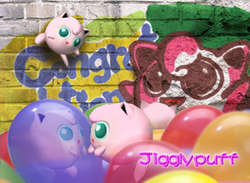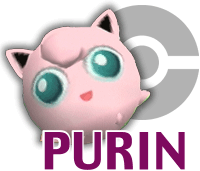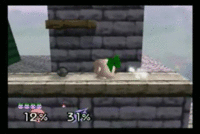Jigglypuff (SSB)
| Jigglypuff in Super Smash Bros. | |
|---|---|
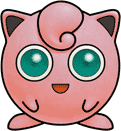 
| |
| Universe | Pokémon |
| Other playable appearances | in Melee in Brawl in SSB4 in Ultimate |
| Availability | Unlockable |
| Tier | B (6) (North America) ? (8) (Japan) |
Jigglypuff (プリン, Purin) is an unlockable character in Super Smash Bros. Mainly included due to its popularity in the anime, Jigglypuff is notable for its similar appearance and nature to Kirby, and the fact that they share a lot of moves makes them semi-clones. It is the floatiest and lightest character in the game, a trait it has kept in subsequent appearances.
Jigglypuff is voiced by Rachael Lillis in English and Mika Kanai in Japanese, its voice actresses in the dubbed and the original anime.
Jigglypuff ranks 6th, right in the middle of the tier list, in the B tier. It is notable for being the lightest, floatiest, and lowest gravity character in the game. Jigglypuff has many low knockback attacks, which when combined with its floatiness, can be abused to its advantage in several combos against heavier characters, especially by gimping them or carrying them all the way to the lateral blast lines. It also has some moves with disproportionate power, like its up smash, back throw and the famous Rest. However, because Jigglypuff is so light and floaty, it is very easy to KO. In addition, Jigglypuff lacks a rising up special move for recovery, forcing it to rely on its remaining midair jumps and Pound to recover.
Jigglypuff's pros are considered to be on par with its flaws, and because of this, it has some favorable to even matchups in the current metagame, and has achieved above average tournament representation and results. However, Jigglypuff ranks worse in Japan at 8th, due to the higher strengths some other characters have in comparison to Jigglypuff.
How to unlock
Complete 1P Game, then defeat Jigglypuff on Saffron City.
Note: Jigglypuff can be unlocked after Ness and/or Captain Falcon if criteria for the latter two is fulfilled during the 1P Game.
Attributes
Most of Jigglypuff's moveset consists of low knockback attacks. Its great aerial mobility makes up for the fact that it has the second slowest dash speed. It can also use the teleport techique to help with its ground game. Jigglypuff also has in its arsenal surprisingly powerful finishing attacks, such as its up smash.
Jigglypuff's ground attacks are generally slow and weak, other than its smashes. Neutral attack, forward tilt, and down tilt have little use in general. Up tilt is also weak but can be used for combos at low-mid percentages, and it can lead into an up smash or Rest as a finisher. Forward smash is a decent finisher at high percents, up smash is one of the strongest in the game, while down smash sends the opponent at a semi-spike trajectory, making it useful for edgeguarding. Jigglypuff has some good aerials, with a good edgeguarding ability. Its down air can meteor smash, but its weak which makes it better at setting follow ups.
Jigglypuff has a unique set of special moves, which can be considered "extreme". This means they have some very good things about them, but also some very poor things about them. Its neutral special move (Pound) has short range (like all of Jigglypuff's moves) and a little bit of starting lag, but it does very high damage, good knockback, a lot of shield damage, and can easily give Jigglypuff additional recovery, especially horizontally. Its down special move (Rest) is known for having incredible strength if it connects, decent ending lag, very fast starting time, poor range, and providing invincibility frames until its eyes close. It is an excellent combo finisher, and can be combo'ed into from a variety of follow ups such as up tilt, down air and up air. Its forward throw can be combo'ed into rest for a kill at med percents against fast fallers like Captain Falcon, Fox, Link along with characters with high falling speed such as Yoshi and Donkey Kong, which is known as the Space animal slayer. Its up special move, Sing, puts opponents to sleep, but unlike in 'future games, it keeps opponents asleep longer at low percentages. This allows it to start combos at low percents.
On the receiving end, Jigglypuff's floatiness, low weight, and small size make it difficult to land long combos on it. Furthermore, Jigglypuff's slow falling speed, five midair jumps, good air speed, and Rising Pounds allow it to recover from almost any distance horizontally. On the downside, its vertical recovery is very bad due to only three of its midair jumps giving actual height (its fourth midair jump gives next to no height, and its fifth merely slows its descent) and it lacking a rising up special move. This makes it very vulnerable to meteor smashes and semi-spike attacks like Fox's Shine spike. Also, Jigglypuff's slow falling speed makes it very easy to juggle, and very vulnerable to characters with powerful vertical finishers, such as Fox with his up smash and up aerial. Light weight also has its downside, as Jigglypuff will often be knocked out at earlier then any other character. If Jigglypuff's shield breaks when there is no ceiling, it will be Star KOed, so Jigglypuff players must be very careful when shielding multi-hit attacks and attacks that cause high shield damage. This is problamatic in certain matchups, like Yoshi, who posses strong shield break combos.
Differences between game versions
NTSC-J to NTSC-U
Jigglypuff was buffed overall in the transition to NTSC-U, with the longer range on its down smash helping it edgeguard opponents, and the much higher power of Rest making it a go-to finisher out of a combo. However, the removal of momentum sliding slightly hurts its approach. Overall, Jigglypuff is slightly better than in the Japanese version.
Attributes
 The removal of momentum sliding slightly hinders Jigglypuff's approach.
The removal of momentum sliding slightly hinders Jigglypuff's approach.
Ground attacks
 Down smash has more range on both sides.
Down smash has more range on both sides.
Special attacks
 Rest deals 6% more damage (14% → 20%) and has increased knockback (20 (base), 140 (scaling) → 60/120).
Rest deals 6% more damage (14% → 20%) and has increased knockback (20 (base), 140 (scaling) → 60/120).
NTSC-U to PAL
Jigglypuff was indirectly buffed further in its transition to PAL, due to the teleport glitch covering more distance, which in turn gives Jigglypuff better approach options.
Attributes
 Teleport goes farther, making it a better approach option.
Teleport goes farther, making it a better approach option.
Moveset
| Name | Damage | Description | ||
|---|---|---|---|---|
| Neutral attack | 3% | A fast pair of jabs. The first is usually used in the middle of combos for some extra damage. The second is rarely used due to it having more ending lag. | ||
| 4% | ||||
| Forward tilt | 8% | Circles in place and kicks. Can be angled. The knockback angle can be adjusted according to the angle of the attack. | ||
| Up tilt | 10% | Swings a foot behind, hitting above its head for a low knockback attack that sends the opponent up at a steep angle. If hit at the correct spot, this attack can be used repeatedly as an u-tilt chain or as a setup for more powerful attacks. However, at low percents, the sourspot (closest to Jigglypuff) is very punishable and has knockback similar to a jab. It is, essentially, a slower, weaker version of Kirby's version, with identical animations and comparable disjointed range. | ||
| Down tilt | 10% | Hitting just slightly in front, Jigglypuff's d-tilt sends the opponent upwards at a 70 degree angle. This attack is similar to the f-tilt angled up, with the main difference being that it has more cool down lag. | ||
| Dash attack | 10% (clean), 6% (late) | A generic dash attack, Jigglypuff trips over and slides, hitting opponents in front of it. | ||
| Forward smash | 16% (clean), 10% (late) | This attack sends Jigglypuff forward with a quick burst of speed. One thing to note is that the hitbox comes out near the end of the attack, so if spaced and timed correctly, the opponent can grab the oncoming Jigglypuff before the attack connects. Above average knockback and a good finisher, despite being one of the weakest forward smashes in the game. | ||
| Up smash | 18% (clean), 10% (late) | Rocks its head back then forward for an attack. If the opponent is hit early, this attack sends the opponent straight up for quick, low-percent kills, being tied with Mario and Luigi for the strongest up smash. At the last few frames of the attack, the hitbox exists only in front of Jigglypuff and sends the opponent forward with much less knockback. This attack is often used as a finisher. | ||
| Down smash | 16% (clean), 10% (late) | Does a split, sending opponents on either side at a low angle. The hitbox extends quite a bit beyond Jigglypuff's feet, and this disjointed hitbox is most often used for edgeguarding, as it allows the player to avoid getting hit by the recovering opponent while still being able to prevent the opponent from grabbing the ledge. It can also attack opponents already on the ledge. | ||
| Neutral aerial | 14% (clean), 9% (late) | Extends a foot out, sending the opponent back. This move comes out quickly, has a decent-sized, disjointed hitbox, and lasts for quite a while. Has sex kick properties. | ||
| Forward aerial | 13% (clean), 9% (late) | Leans back and extends both feet out. Unlike most forward aerials, this one has sex kick-like properties — it loses power with time and lasts for quite a while. However, it isn't exactly a sex kick. This attack is often considered a weaker and shorter ranged version of Jigglypuff's nair. | ||
| Back aerial | 13% (clean), 9% (late) | Spins and kicks backwards. This attack has low knockback and can be chained into more back aerials, although it isn't nearly as effective as Melee's Wall of Pain. | ||
| Up aerial | 16% | Slaps upwards, making an arc with its arm, sending opponents upward. The hitbox extends throughout its body. Because the knockback is consistent throughout the hitbox, if the opponent is hit at the lower part of the hitbox, it may set up for aerial combos. Can KO floaty opponents at moderately high percents. | ||
| Down aerial | 30% maximum, 3% (landing) | Like all drill kicks (other than Kirby's), this attack has very low knockback and traps the opponent. When Jigglypuff lands while hitting the opponent with this attack, it can be followed up with almost any ground attack, depending on the DI. It is a very weak meteor smash, the weakest in the game, but can nonetheless be used for edgeguarding. 3% per hit (total 10 hits). | ||
| Grab | — | |||
| Forward throw | 14% | Unlike most f-throws, this throw sends opponents straight up. This is both bad and good, as the attack rarely KOs and can't set up edgeguards, but at low percentages, it can be useful for combos. | ||
| Back throw | 16% | Throws the opponent backwards. This throw is among the most powerful throws in the game, knockback-wise. | ||
| Forward roll Back roll |
— | — | ||
| Techs | — | — | ||
| Floor attack (front) Floor getups (front) |
6% | Spins around on both sides, kicks, then gets up. | ||
| Floor attack (back) Floor getups (back) |
6% | Spins around on both sides, kicks, then gets up. | ||
| Edge attack (fast) Edge getups (fast) |
4% | Does a flip while curling and sticks it's foot out. | ||
| Edge attack (slow) Edge getups (slow) |
4% | Slowly gets up and lunges forward with its body. Will not hit foes right next to the ledge where Jigglypuff is. | ||
| Neutral special | Pound | 13% | Does a punch forward which gives a bit of distance forward in midair. Usually used as a recovery move, as it can be aimed upwards and down, the former is referred to as Rising Pound and, when combined with midair jumps, can give Jigglypuff a good horizontal recovery, although an accidental input will cause Jigglypuff to use Sing, not useful for recovery. (This technique is required to complete Jigglypuff's Board the Platforms level.) The hitbox stays out surprisingly long and the attack does high shield damage. During the end lag, Jigglypuff can fast fall. | |
| Up special | Sing | 0% | Sings, anyone nearby will be sent to sleep. Unlike in Melee and Brawl, opponents sleep for longer at lower percentages. Unlike most up specials, it is not a recovery move, and will most certainly lead to a self-destruct if used offstage due to its long ending lag. It has very limited use owing to its small range and because usually by the time Jigglypuff ends its song, the opponent could have already mashed out. | |
| Down special | Rest | 20% | Falls asleep for approximately 4 seconds, unable to perform any action during its duration. Jigglypuff has brief invincibility during the startup until its eyes close. However, with the extreme ending lag, it is not a good option to dodge attacks with, as the opponent can use almost any attack afterwards. Similar to Sing, using this move offstage will lead to a self-destruct. Normally, it leaves Jigglypuff very vulnerable, but if the opponent is right next to it, they will be sent flying by the attack. It is a powerful move (more powerful than the Falcon Punch) that deals a lot of damage, has high knockback, and can be combo'd into using an up tilt or any aerial, with these combos being possible at a variety of percentages using various moves. | |
On-screen appearance
- Releases from a Poké Ball, similar to Pikachu.
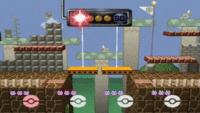
|
|---|
Taunt
- Inflates, puts its arms in front of it, then rocks to its right, then to its left, then to its right again, accompanied by it saying "Jigglypuff!".
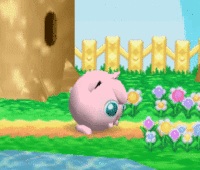
|
|---|
Crowd cheer
| English | Japanese | |
|---|---|---|
| Cheer | File:Jigglypuff Cheer NTSC SSB.ogg | File:Purin Cheer JP SSB.ogg |
| Description | *clap* Jiggly- *clap* -puff | Pur-in |
| Pitch | Group chant | Group chant |
Victory poses
- Jiggles.
- Nods.
- Rests.
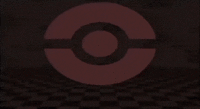 |
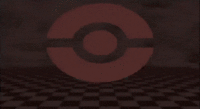 |
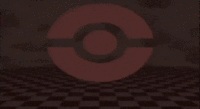
|
|---|
In Competitive play
Matchups
International versions
| Avg. | |||||||||||||
Japanese version
| Avg. | |||||||||||||
Notable players
- See also: Category:Jigglypuff professionals (SSB)
Numbers in brackets indicate position in 64 League Rankings 2017
CTG (#38) - 5th at Get On My Level 2018, 9th at GENESIS 5
DarkGentleman - Ranked 5th in New York City Power Rankings in 2018
Darkhorse (#45) - Falcon main that occasionally plays Jigglypuff and Donkey Kong.
Den-Chan - Japan's original Jigglypuff main, 9th at Kanto 2014
HAMMERHEART (#43) - Samus/Jigglypuff dual main
Hassan - 7th at Kansai 2015
Isai (#11) - Won Apex 2014 using only Jigglypuff
Pucchin - 13th at Kansai 2017
Ringedge - Fox/Jigglypuff main, 17th at GENESIS 5
Ryuka - 9th at Kanto 2017
Sutekina Stacy - 9th at Kanto 2017
tacos (#14) - Yoshi main with multiple secondaries
takuro~ - Japan's 2nd best Jigglypuff, has some high placing at Kanto tournaments (2011: 2nd, 2014 & 2017: 5th)
wangera (#6) A Top 5 player in Japan, considered to be the best Jigglypuff in the World
YBOMBB (#31 (2016)) One of the best 5 players in Canada
Yunque (#47)
Techniques
Teleport
A technique that allows Jigglypuff to slide forward a moderate distance. Jigglypuff can attack, jump, or perform other actions out of the slide (it even allows it to go offstage), and with it giving it some speed, it can be used for movement, faster than just dashing due to Jigglypuff's low dashing speed.
Rising Pound
Using Pound and tilting the control stick up immediately after will cause Jigglypuff to rise up during the move's animation, which can largely increase its horizontal recovery, and is its only real shot at vertical recovery outside its midair jumps.
Fake ledge jump
Description
The Balloon PKMN with the big, round eyes. It sings a soothing melody, sending those that hear it to sleep. When mad, it puffs itself up. As a Balloon PKMN, its body is light, weak, and easy to knock away.
Works:
- Pokémon (GB)
Alternate costumes

| |||
Trivia
- Jigglypuff, along with Pikachu, are technically the first two playable characters in Smash to actually be neutral characters rather than either heroes or villains. This is most likely due to the fact that unlike the human characters in Pokémon, the Pokémon themselves do not have any sense of morality, and therefore do not belong in either alignment, instead willingly choosing to side with whatever alignment said humans are on.
- Jigglypuff, along with Pikachu, are also the first two playable characters in Smash whose actual genders are never revealed. (as with all other playable Pokémon characters except for Mewtwo, who is technically genderless due to it being a legendary, up until the introduction of the Pokémon Trainer in Brawl) This is most likely due to the fact that the first game was released long before the concept of genders was introduced in the Pokémon games proper, explaining why Samus is the only truly female character in that game, as well as the reason why all Pokémon are referred via gender-neutral pronouns such as "it" regardless of said Pokémon's actual gender.
| Fighters in Super Smash Bros. | |
|---|---|
| Fighters | Captain Falcon · Donkey Kong · Fox · Jigglypuff · Kirby · Link · Luigi · Mario · Ness · Pikachu · Samus · Yoshi |
